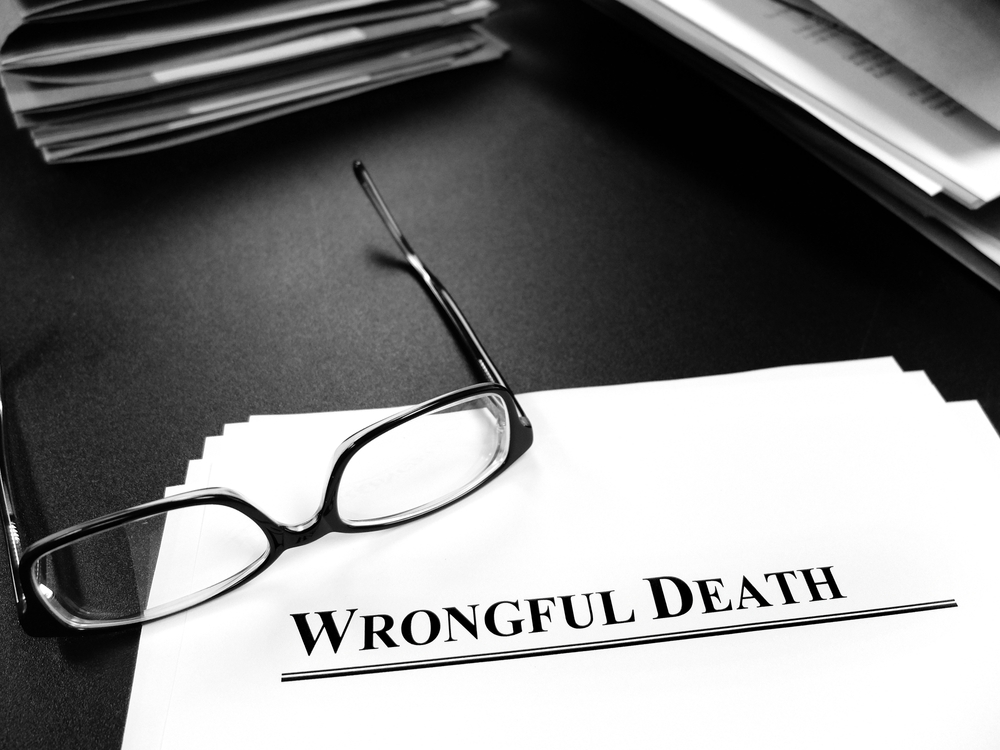A wrongful death occurs when someone suffers fatal injuries due to another party’s negligent or wrongful act. In these circumstances, surviving family members may be eligible to recover monetary compensation for their losses by filing a wrongful death claim or lawsuit.

When taking legal action in a wrongful death case, you should always have a knowledgeable attorney handling every step of your case. Your attorney can promptly investigate the circumstances of the fatal occurrence, explore your legal options, and file a wrongful death claim or lawsuit on your behalf in a timely manner. Your San Antonio wrongful death attorney can also handle all settlement negotiations with insurance company representatives and represent you during all litigation proceedings in court.
[toc_block title=”Table of Contents”]
Occurrences that May Lead to Wrongful Death
Wrongful death involves a tragic incident where a person loses their life due to the negligence or intentional actions of another party. These occurrences can happen in various situations, and surviving families should always have the legal support they need from a wrongful death attorney.
Here are some common occurrences that may lead to wrongful death. This is – by far – not a complete list.
Commercial Truck Accidents
Accidents involving commercial trucks can have devastating consequences. Due to these vehicles’ sheer size and weight, any collision with a smaller passenger vehicle can result in severe injuries or fatalities. Factors such as driver fatigue, speeding, distracted driving, improper maintenance, or overloaded cargo can contribute to these accidents. If a loved one has lost their life in a commercial truck accident, the resulting case can be highly technical and complicated, and the right attorney is necessary.
Construction Accidents

Construction sites are inherently dangerous places, with heavy machinery, hazardous materials, and work at heights. Incidents such as falls from scaffolding, electrocutions, equipment malfunctions, or being struck by objects can all lead to fatal injuries. It is all too easy for a third party to be negligent and lead to a fatal accident. If negligence or violations of safety regulations lead to a wrongful death, family members should immediately consult an attorney to explore their legal options.
Oilfield Accidents and Oil Rig Explosions
Working in the oil and gas industry involves inherent risks due to the volatile materials and complex machinery used. Accidents on oilfields and oil rigs can result in explosions, fires, toxic gas leaks, or equipment failures that can cause severe injuries or fatalities. Negligence, inadequate training, poor maintenance, or failure to comply with safety standards can contribute to these incidents. If a loved one has lost their life in an oilfield accident or an oil rig explosion, find a law firm that regularly handles accident claims involving this industry.
Falls and Premises Accidents
Slip and fall accidents can sometimes result in fatal injuries, especially for older adults who fracture their hips. Unsafe premises, such as poorly maintained walkways, wet floors, or inadequate lighting, can increase the risk of falls. Property owners and managers are responsible for maintaining a safe environment for visitors and tenants. If a negligent property owner or occupier fails to address dangerous conditions and it results in the wrongful death of a loved one, it is necessary to seek legal representation.
Assaults due to Inadequate Security
Inadequate security measures can leave individuals vulnerable to assaults or attacks in certain settings, such as apartment complexes, parking lots, or shopping centers. If someone loses their life due to an assault that could have been prevented with proper security measures, it may be possible to pursue a wrongful death claim against the property owner or manager. Consulting a lawyer familiar with these cases can explain your legal options.
Car Accidents
Car accidents are a leading cause of wrongful death due to the high number of vehicles on the road. Negligent driving behaviors, such as speeding, distracted driving, drunk driving, or running red lights, can lead to devastating accidents, resulting in fatal injuries. If a loved one has died in a car accident due to someone else’s negligence, consulting an attorney can help determine if you have a valid wrongful death claim.
These are just a few examples of occurrences that may lead to wrongful death. If you have lost a loved one due to someone else’s negligence or intentional actions, immediately consult a knowledgeable wrongful death attorney who can guide you through the legal process and seek justice on behalf of your loved one.
Who Can File a Wrongful Death Claim?

Specific individuals who are eligible parties under state law may file a wrongful death claim or lawsuit. Depending on the jurisdiction, these individuals are usually close family members of the deceased, such as spouses, children, or parents. In the absence of these direct family members, other individuals who can establish their financial dependence on the deceased may also be eligible to file a wrongful death claim.
The surviving spouse often has the primary right to initiate a wrongful death action. If there are surviving children, they may have the right to file a claim as well, either individually or collectively. Parents of the deceased may also have the right to file a wrongful death lawsuit, especially if there are no surviving spouses or children.
In cases where there is no surviving spouse, children, or parents, the right to bring a wrongful death claim may extend to other family members who can demonstrate their financial dependence on the deceased. This may include siblings or grandparents who were financially reliant on the deceased individual.
Additionally, adopted children, stepchildren, and sometimes even putative spouses (those who believed in good faith that they were legally married) may have the legal standing to file a wrongful death claim. However, the eligibility criteria can vary based on the jurisdiction, and it is essential to consult with legal professionals to determine the specific circumstances under which a particular individual can initiate a wrongful death lawsuit.
The key factor in determining who can file a wrongful death claim lies in the familial relationship and financial dependence on the deceased. The goal of the legal system is to provide a means for those most directly affected by the loss to seek compensation for their emotional and financial suffering resulting from the wrongful death of a loved one.
Understanding the specific rules and regulations governing wrongful death claims ensures that the right individuals have the legal standing to pursue justice on behalf of the deceased.
When to Settle or Litigate a Wrongful Death Case
Deciding whether to settle or litigate a wrongful death claim is a nuanced process that requires careful consideration of various factors. One crucial element is the strength of the case and the available evidence. Evaluating the merits of the claim, including the extent of negligence or wrongdoing that led to the wrongful death, helps determine the likelihood of success in court.

The willingness of the parties involved to negotiate and reach a reasonable settlement is another pivotal factor. Open and transparent communication between the representatives of the deceased’s estate and the responsible party’s insurance company can shed light on the potential for a fair and satisfactory settlement. If there is a willingness to engage in meaningful discussions and find common ground, settling the wrongful death claim may be a viable option.
The financial implications of litigating versus settling should also be weighed. Legal proceedings can be lengthy and costly, involving expenses related to court fees, expert witnesses, and attorney fees. Evaluating the potential costs and benefits of pursuing a legal case versus accepting a settlement is crucial in making an informed decision.
Consideration should also be given to the emotional toll of litigation. Courtroom proceedings can be emotionally taxing for surviving family members, prolonging the healing process. Assessing the emotional readiness of the family to endure a potentially protracted legal battle can influence the decision to settle or litigate.
The strength of the available insurance coverage is another determinant. If the responsible party has substantial insurance that can adequately compensate for the damages, settling may provide a more efficient means of securing compensation without the uncertainties associated with litigation.
Ultimately, the decision to settle or litigate a wrongful death claim is highly individual and depends on the unique circumstances of each case. Seeking guidance from experienced wrongful death attorneys can provide valuable insights.
Family members should immediately seek a free consultation with a lawyer if they haven’t done so already in the process.
Statute of Limitations for Wrongful Death Lawsuits

The statute of limitations for filing a wrongful death lawsuit establishes a time limit within which parties must initiate legal action. In the wrongful death context, knowing the timeframe in which a claimant must bring a wrongful death lawsuit is necessary. The statute of limitations varies from state to state, and a wrongful death attorney in your area can advise on the deadline for a lawsuit that applies to your case.
Typically, the clock starts ticking from the date of the deceased individual’s death. Failing to file a lawsuit within the prescribed period may result in the complete loss of the right to pursue legal action for compensation.
In wrongful death cases arising from intentional acts, such as homicide, the statute of limitations might differ from cases involving negligence. Your attorney will examine the specific circumstances surrounding the wrongful death to accurately determine the applicable statute of limitations.
Exceptions to the standard statute of limitations may exist under certain circumstances. For instance, if there is a delay in discovering the cause of death or if the deceased’s representative is a minor, these factors may influence the timeframe within which parties can file a lawsuit.
Understanding and adhering to the applicable statute of limitations is critical. Initiating legal proceedings within the stipulated time frame ensures that the claim is recognized by the legal system, safeguarding the rights of the surviving family members seeking justice for the wrongful death of their loved one.
Legal advice is invaluable in wrongful death claims and ensuring compliance with the pertinent statute of limitations in a particular jurisdiction.
Recovering Financial Compensation in a Wrongful Death Case

In the aftermath of a wrongful death, surviving family members may pursue financial compensation for different losses. Available compensation differs from state to state, but the following damages are generally available in most jurisdictions.
Economic damages are a significant component of wrongful death compensation. These damages typically include medical expenses incurred before the deceased’s passing, funeral and burial costs, and the loss of financial support the deceased would have provided to the family had they survived the fatal occurrence. Calculating economic damages requires a thorough assessment of the deceased’s earning potential and financial contributions to the family.
Loss of consortium is a non-economic aspect of compensation, addressing the emotional and relational losses that the surviving family members suffered. This acknowledges the effect of the deceased’s absence on the family’s emotional well-being, companionship, and guidance. Spouses, children, and parents may seek compensation for the intangible losses resulting from the wrongful death.
Pain and suffering damages compensate for the intense emotional distress surviving family members experienced from their tragic loss. Witnessing a loved one’s untimely death can result in profound emotional suffering, and compensation for pain and suffering aims to acknowledge and mitigate this aspect of the loss.
In cases where the conduct leading to wrongful death was criminal or egregious, punitive damages may be available. Unlike compensatory damages that aim to restore the family to their previous financial and emotional state, punitive damages are punishment for the at-fault party and a deterrent against similar misconduct in the future.
The total compensation available in a wrongful death claim aims to address both the tangible and intangible losses that surviving family members experienced. Wrongful death lawyers can accurately calculate losses and provide evidence to insurance companies or in court to obtain full compensation from liable parties.
Ultimately, the financial compensation available through a successful wrongful death claim or lawsuit should help alleviate the economic burdens resulting from the death and acknowledge the profound emotional toll on the surviving family members. By seeking comprehensive compensation, surviving family members strive to find a measure of justice and financial stability in the wake of their devastating loss.
Call an Experienced Wrongful Death Lawyer in Your Area Right Away

If you recently lost a loved one in an occurrence that resulted from someone else’s negligent or wrongful act, consult a skilled wrongful death attorney in your area right away. Your attorney can promptly review available legal options in your case and file a claim or lawsuit on your behalf within the applicable statute of limitations.
Your attorney will also work to maximize the total settlement or award you receive, helping to bring about the justice and closure you and other family members need at this extremely difficult time.
Consultations are free, so act now to begin seeking the compensation and support your family needs.
